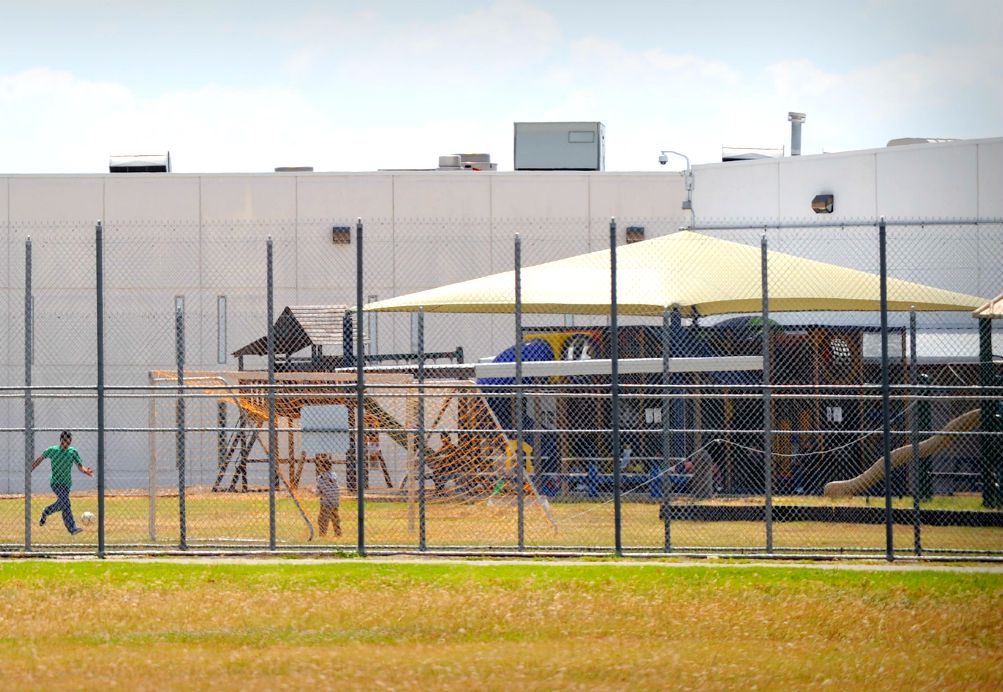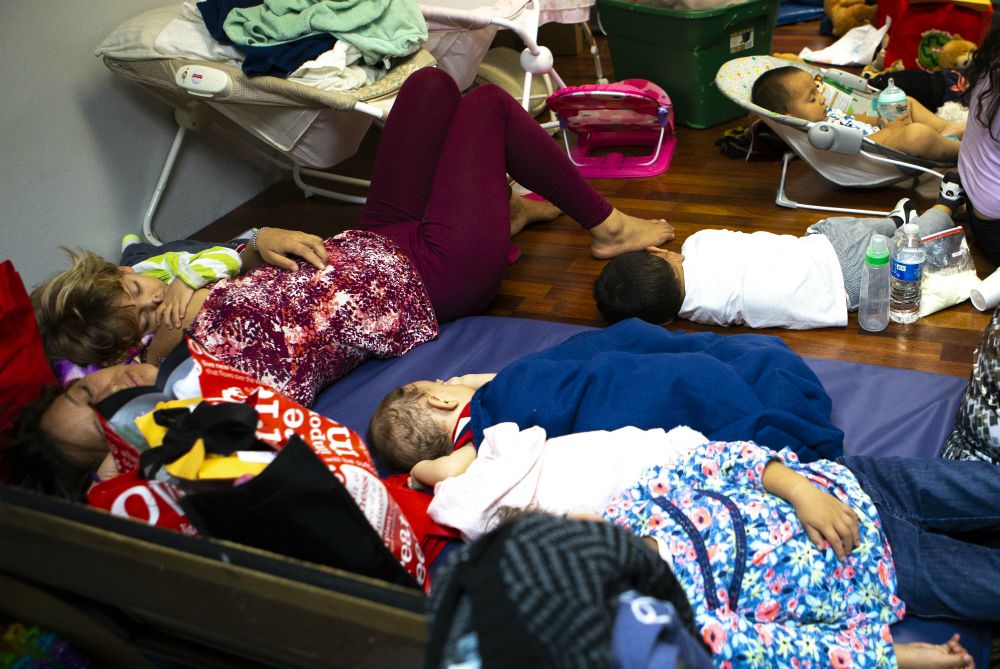
Children play in a double-fenced playground area outside the T. Don Hutto Family Residential Facility in Taylor, Texas, in this undated photo. (CNS/Bahram Mark Sobhani)
Catholic advocates are decrying a proposed rule from the Department of Homeland Security (DHS) and the Department of Health and Human Services (HHS) that would allow immigrant children to be detained with their parents indefinitely while eliminating some licensing requirements for detention facilities that are meant to ensure they receive adequate care.
"What we're talking about is an architecture of cruelty reflected in national policy, which I think can only be understood in terms of structural sin," said Camilo Perez-Bustillo, Director of Advocacy, Leadership Development and Research for the Hope Border Institute. He described the new rule as "a system deliberately set up to make the defense of people's rights and the recognition of their humanity and dignity as difficult as possible."
The rule, released in an over-200-page document Sept. 6 and officially published in the Federal Register Sept. 7, states it is intended to implement "with some modifications" the Flores Settlement Agreement, which has regulated the treatment of immigrant children in government custody since 1997.
"The rule would satisfy the basic purpose of the [Flores Settlement Agreement] in ensuring that all juveniles in the government's custody are treated with dignity, respect, and special concern for their particular vulnerability as minors, while doing so in a manner that is workable in light of subsequent changes," its summary states.
But the rule seems to contradict some notable aspects of the settlement, which is intended to terminate 45 days after the government publishes regulations that implement it.
The settlement, reached after the Flores v. Reno case challenged the treatment of children in detention, requires that juveniles be held in facilities that are licensed by state agencies to care for children and generally limits detention of children to 20 days.

Camilo Perez-Bustillo (Provided photo)
Arguing that states "generally do not have licensing schemes for facilities to hold minors who are together with their parents or legal guardians," the rule instead creates a federal licensing system for such facilities, and says this new plan "may result in extending detention of some minors, and their accompanying parent or legal guardian, in [Family Residential Centers] beyond 20 days."
Because the new licensing system allows the federal government to set the standards by which detention centers are audited and choose the company that audits them, "it's really creating a system rife with conflict of interest in oversight," said Karen Sullivan, an advocacy attorney for the Catholic Legal Immigration Network (CLINIC).
Weakened standards are especially concerning because of nationwide reports of "deficiencies in existing detention centers," Perez-Bustillo said. "Instead of doubling down and requiring that the conditions be more stringent — which is how one would assume it would make rational sense to respond; when something goes wrong you try to do it better — the regulations essentially propose to do it worse and to further dilute the applicable standards."
Sullivan also cited the risks of child detention under any circumstances, including psychological trauma, lack of access to medical care and greater difficulty accessing legal counsel. Lack of legal counsel makes asylum seekers more likely to lose their cases and be deported back to dangerous conditions, she said.
"As Catholics, we're called to welcome the stranger, and these regulations move us farther away from that goal rather than closer," Sullivan added. "Those seeking asylum in our community are being denied freedom and dignity. Pope Francis was hoping for migrants that they encounter acceptance, solidarity and hope after fleeing tragedy in their country, and there's just very little of those in family detention centers."
Other parts of the rule that worry advocates include allowances for lower standards during emergencies and a provision that states officials can reevaluate an immigrant's unaccompanied minor designation at any time, potentially stripping away the extra protections that come with unaccompanied status.

Exhausted immigrants, recently released from U.S. custody, sleep on the floor of a Catholic Charities-run respite center in McAllen, Texas, July 1. (CNS/Chaz Muth)
Before the rule can go into effect, it is subject to a 60-day comment period to allow input from members of the public. The comment period is followed by 45-day delay to give administration officials the chance to review the comments and consider making changes.
"I'm sure they'll be fast-tracking it," Perez-Bustillo said. "I don't think the comments will have any significant impact."
Sullivan, who said CLINIC was encouraging its network to comment and was "absolutely planning to issue a detailed comment," expressed more hope.
"I certainly don't know what those probabilities are, but I do know that public commenting absolutely has an impact," she said, adding that in past cases commenting organizations or individuals have been "able to show the administration that there is a better way."
CLINIC's comments will likely focus on the argument "that the administration is trying to push a false choice" by implying that since the public and the courts rejected family separation, "the only other option is to detain children with their families," Sullivan said. "That's not an acceptable alternative, and there are better options."
Sullivan and Kevin Appleby, Senior Director of International Migration Policy for the Center for Migration Studies of New York, both pointed to alternatives to detention such as a family case management program whereby Catholic Charities and other sponsors help families find housing, services and legal aid and ensure they return for court dates. The program is reported to be 99 percent effective and much cheaper than detention.

Karen Sullivan (Provided photo)
Perez-Bustillo mentioned ankle tracking bracelets as another tactic that has been successful in getting migrants to return for their court dates while allowing them to be released from detention.
While it is appropriate for faith-based advocates to "insist on the highest possible standard" for family detention conditions, he added, they shouldn't lose track of the obligation to challenge the entire premise "that it is legitimate to cage families." This is especially true when the families are asylum seekers requesting protection under U.S. law, he said later.
If the rule makes it through the comment period without major changes, it will likely face legal challenges, beginning with the court overseeing the Flores Settlement Agreement, said Perez-Bustillo. He speculated the rule might be a political move before the upcoming midterms rather than a policy the administration expects to be able to put in motion in the near future.
Appleby suggested that the rule might be meant to "get the word out as a deterrent" for migration, even if it doesn't survive legally.
But Appleby, Sullivan and Perez-Bustillo agreed that no form of deterrence is effective over the long term when families are facing extreme danger in their home countries.
"As long as the conditions persist that deny people a dignified life where they live, they're going to come, and the data bears that out," said Perez-Bustillo. "So until those conditions are addressed, no rhetoric will be enough, and no policy, however cruel, will be enough, because there continue to be those causes at the root."
[Maria Benevento is an NCR Bertelsen intern. She can be reached at mbenevento@ncronline.org.]
Advertisement








